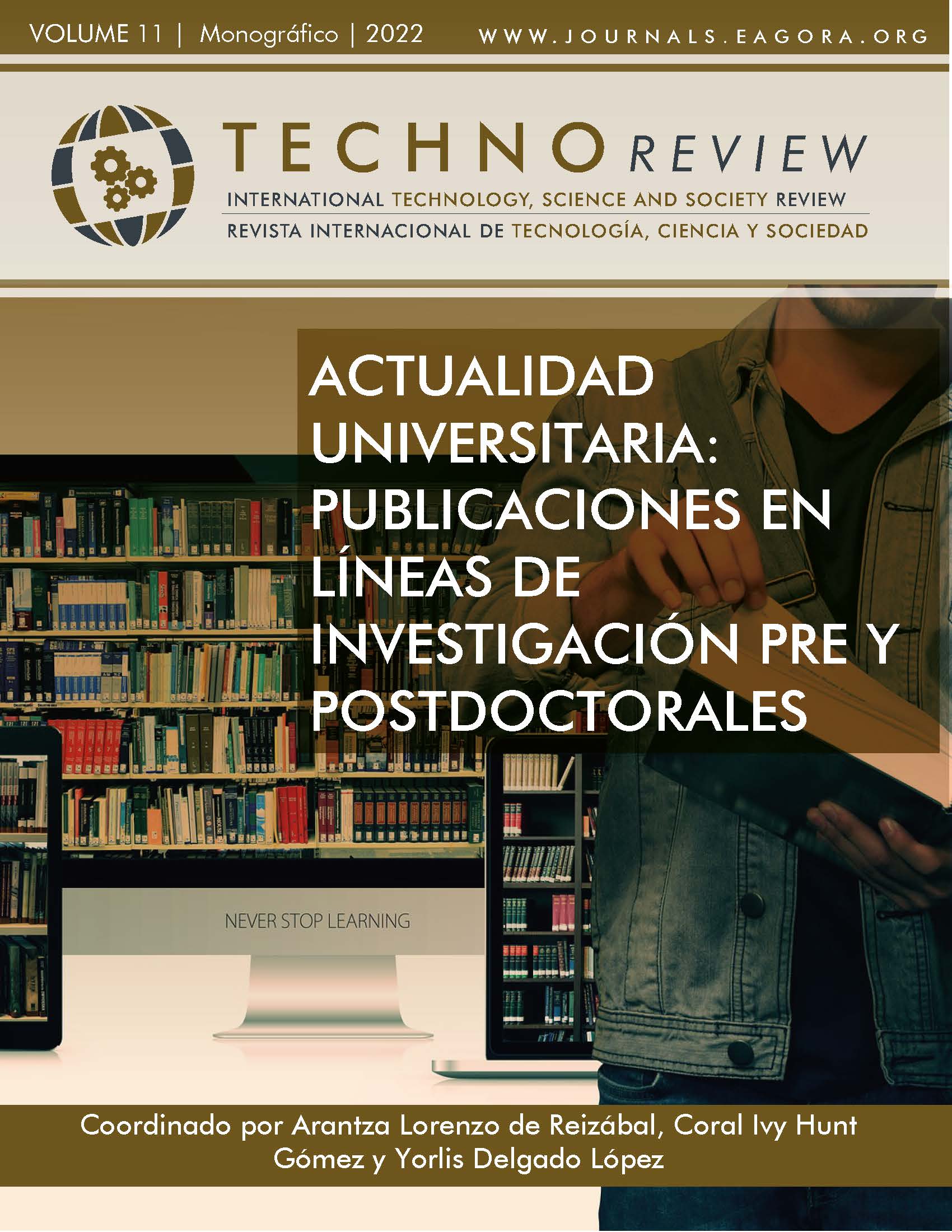Twenty-first century tendencies: characters, confrontation and freedom in the us teleserial post-drama
Cultural hybridizations with Spanish-language dramatic culture
DOI:
https://doi.org/10.37467/revtechno.v11.4439Keywords:
North American post-drama TV series, Twenty-first century TV series in the U.S., U.S. TV series, Spanish-language dramatic culture, Post-dramatic trends of the twenty- first century in TV fictionAbstract
The purpose of the ensuing research is to highlight the patterns of the transformations that have taken place in some of the most prestigious television series in the United States in terms of conflict, characters and the decomposition of the classic categories (freedom). Methodologically, the aim is to make an empirical analysis, within the framework of certain scientific models, that would address the current North American tele-serial post-drama and its antecedents in the dramatic culture so typical of the libertarian and anti-classical worldview that enriches the Spanish language.
References
Barrientos-Báez, A. (2019). El desarrollo de la Inteligencia Emocional en los estudios del Grado en Turismo en la Universidad de La Laguna (Tenerife). Tesis Doctoral. Universidad Camilo José Cela. Madrid. https://bit. ly/3wWEPnk
Martínez-Sala, A. M., Barrientos-Báez, A., & Caldevilla-Domínguez, D. (2021). Fandom televisivo. Estudio de su impacto en la estrategia de comunicación en redes sociales de Netflix. Revista de Comunicación de la SEECI, 54, 57-79. http://doi.org/10.15198/seeci.2021.54.e689 DOI: https://doi.org/10.15198/seeci.2021.54.e689
Orosa, M. Á., & López-López, P. C. (2018). Postdrama culture in Ecuador and Spain: Methodological framework and comparative study. Comunicar, 57(26), 39-47. DOI: https://doi.org/10.3916/C57-2018-04
Orosa, M. Á., López-Golán, M., Márquez-Domínguez, C., & Ramos-Gil, Y. (2017). The American postdramatic television series: the art of poetry and the composition of chaos (How to understand the script of the best American television series). Revista Latina de Comunicación Social, 72, 500-520. http://doi. org/10.4185/RLCS-2017-1176
Orosa, M. Á., López-Golán, M., Márquez-Domínguez, C., & Ramos-Gil, Y. (2017). El posdrama teleserial norteamerciano: poética y composición (Cómo entender el guion de las mejores series escritas para la televisión en los Estados Unidos). Revista Latina de Comunicación Social, 72, 500-520. http://doi. org/10.4185/RLCS-2017-1176 DOI: https://doi.org/10.4185/RLCS-2017-1176
Orosa Roldán, M. Á. (2012). El cambio dramático en el modelo teleserial norteamericano. Publicia, Saarbrücken.
Orosa, M. Á., Collado-Campaña, F., & Galarza-Ligña V. (2021). The (Post-)theatre of the TwentyFirst Century in Spain and the North American Post-drama TV Series: A Political, Historic and Comparative Research. Playwrights, Patterns and All-Embracing Point of View. In: Á. Rocha et al. (eds.), Marketing and Smart Technologies, Smart Innovation, Systems and Technologies (pp. 573-584). Springer. http://doi. org/10.1007/978-981-33-4183-8_45 DOI: https://doi.org/10.1007/978-981-33-4183-8_45
Orosa, M.A., Lema, D., & Galarza-Ligña, V. (2022). Twenty-First Century Trends and International Cross-Cultural Perspective: The Post-dramatic TV Series Model in the United States vs. Spain’s Neoclassical Hesitancy in Television Serial Fiction. In: Rocha, Á., Barredo, D., López-López, P.C., Puentes-Rivera, I. (eds) Communication and Smart Technologies. ICOMTA 2021. Smart Innovation, Systems and Technologies, (pp.333-343). Springer. https://doi.org/10.1007/978-981-16-5792-4_33 DOI: https://doi.org/10.1007/978-981-16-5792-4_33
Orosa, M. Á., Galarza-Ligña, V., & Culqui, A. (2019). Postdrama communication in Spanish language: Ecuador and Spain. Origins and current scene. The indigenous postdrama. (La flor de la Chukirawa, by Patricio Vallejo Aristizábal, and Gólgota Picnic, by Rodrigo García.). RISTI, 20, 350–363. http://www.risti.xyz/issues/ ristie20.pdf
Orosa, M. Á., Lema D., Galarza-Ligña V., & Culqui A. (2020). Ecuador: the popular liturgical and festive origins of the Latin American indigenous post-drama and its specific conflict. Comparisons with the Spanish and European post-drama. Proceedings of 15ª Iberian Conference on Information Systems and Technologies. Springer, Heidelberg. 279-288. http://doi.org/10.23919/CISTI49556.2020.9140902 DOI: https://doi.org/10.23919/CISTI49556.2020.9140902
Pérez Priego, M. Á. (2004). El auto de los Reyes Magos. Arbor, 177, 611-621. DOI: https://doi.org/10.3989/arbor.2004.i699/700.598
Poza Diéguez, M. (2015). El Concepto de Teatralidad en el Teatro Medieval Castellano. Espéculo, 26. https://webs.ucm.es/info/especulo/numero26/teamedie.html
Sarrazac, J. P. (2010). El drama no será representado. Teatrología, 92-103.
Downloads
Published
How to Cite
Issue
Section
License
Those authors who publish in this journal accept the following terms:
- Authors will keep the moral right of the work and they will transfer the commercial rights.
- After 1 year from publication, the work shall thereafter be open access online on our website, but will retain copyright.
- In the event that the authors wish to assign an Creative Commons (CC) license, they may request it by writing to publishing@eagora.org








